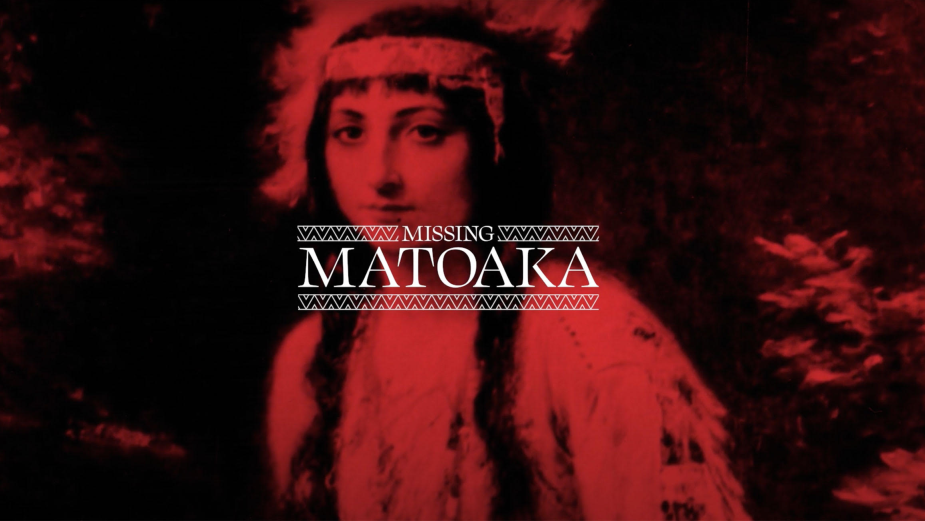
'Missing Matoaka' Tells the True Story of Pocahontas from an Indigenous Perspective

A powerful new project created by a team of Indigenous creators presents an alternative audio track to a film made about Pocahontas, correcting the stereotypes and historical inaccuracies that perpetuate a romance between an “Indian Princess” and a dashing European explorer.
Instead, 'Missing Matoaka' tells the much darker true story about one of the first documented missing and murdered First Nations woman. The project was developed for Indigenous arts and culture publication MUSKRAT Magazine by BBDO Canada. The Indigenous team of creators includes Anishinaabe and Haudenosaunee-Cree writers from Chippewas of the Thames and the Michel Band, Poundmaker Cree and Métis voice talent, with a member of Oneida Nation of the Thames overseeing creative development.
“MUSKRAT Magazine is thrilled to help share the Missing Matoaka project and unveil the real story of Pocahontas,” says Rebeka Tabobondung, publisher and editor-in-chief of MUSKRAT Magazine and member of the Wasauksing First Nation. “We believe that Indigenous stories must be told through the lens and voices of Indigenous people who bring a necessary truth to centuries of misrepresentation and destructive colonial whitewashing.”
The project brings to life the real story of Pocahontas (whose original name was Matoaka), doing away with the historical whitewashed storyline about a romance between the British explorer John Smith and a buxom young Indigenous woman. This false narrative was established 10 years after these events by John Smith himself, and the falsehood has been embellished and perpetuated ever since, especially in film. Over 10 films have been made about Pocahontas and all have participated in furthering the stereotype.
This depiction continues to shape a false narrative about Indigenous women being more sexually available and “less worthy” than their non-Indigenous counterparts. This has manifested itself into some chilling real-world statistics, including the fact that Indigenous women are 12 times more likely to be murdered or go missing than any other demographic group, 16 times more likely to be slain or to disappear than white women, and the fact that four out of five Indigenous women will experience violence in their lifetime.
In its place is an educational—and more accurate—story about the abduction, assault and murder of Indigenous girls and women. It is intended to set the record straight on several harmful misconceptions and stereotypes surrounding the story of Pocahontas/Matoaka:
· She was only 10 years old when she first encountered John Smith. And unlike the false narrative, she didn’t abandon her people. Instead, the European invaders kidnapped Matoaka and held her hostage;
· She was sexually assaulted and forced to marry one of her captors as a condition of her release, but would never be truly free again;
· She was taken from her homelands and paraded around Europe as an example of successful colonization. She died from disease/poisoning fleeing England when she was just 20 years old.
Available at MissingMatoaka.ca, this alternative audio is scored with music, sound effects and dialogue that come together to tell the real story of Matoaka—the real name of the woman known in popular culture as Pocahontas—and was created using Indigenous voices and instruments to ensure its authenticity.
“This is not a story about the power of striking love,” states the voiceover that accompanies the audio track’s beginning. “This is not a story about glory, God, and gold. Nor a romance. This is a tragic tale of a woman who was assaulted and kidnapped from her people, from her identity.”
"The life of Matoaka is a chilling reality of the literal horror of invasion, enslavement, rape and murder," says screenwriter Lauren DeLeary, who is Ojibwe and a member of the Chippewa of the Thames First Nation. "It is unfathomable that it can be funneled down so far from reality that it was made into a children's movie, perpetuating lies and the fetishization of Indigenous women. It has taken over 400 years to tell this story correctly. Now more than ever it is time for Indigenous voices to be heard."
Matoaka/Pocahontas is voiced by Quinn Roffey-Antoine, a victim rights advocate at Aboriginal Legal Services in Toronto who had no voice acting experience prior to the project. “To have the opportunity to help redefine the voice of Pocahontas has been an honour,” says Roffey-Antoine. “Through my work, and as an Indigenous woman myself, I see the violence Indigenous women face at the hands of colonialism daily. This project is about reclaiming our stories.”
The project’s creative director, BBDO SVP and ECD, Derek Blais, is a member of Oneida Nation of the Thames. Blais has deep and painful knowledge of the atrocities committed against North America’s Indigenous population. His grandmother attended a Residential School, while his mother was taken away as an infant in The Sixties Scoop.
“It has been my honour to create and oversee this project,” says Blais. “The women in my family have been through generations of trauma, and to be able to bring the story of an Indigenous woman, Matoaka, to life and highlight the harmful effects of these stereotypes towards our women in this way is hard to put into words.”
The audio track is housed at MissingMatoaka.ca, which also highlights Call for Justice 6.1 that came out in the Final Report of the National Inquiry into Missing and Murdered Indigenous Women and Girls.
Directed at governments, institutions, social service providers, industries, and all Canadians, it calls for “proactive steps to break down the stereotypes that hypersexualize and demean Indigenous women, girls, and 2SLGBTQQIA people, and to end practices that perpetuate myths that Indigenous women are more sexually available and less worthy than non-Indigenous women because of their race or background.















